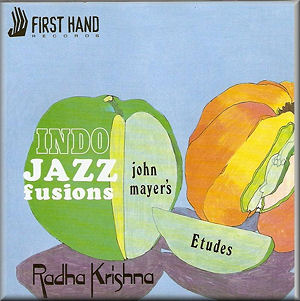1. Intro and Rondo
2. Capriccio
3. Serenade
4. Toccata
5. Saraband
6. Radha Krishna, Act 1
7. Radha Krishna, Act 2
Tracks 1-5
John Mayer - Violin
Chris Taylor - Flute
Ian Hammer - Trumpet, flugelhorn
Tony Coe - Tenor sax, clarinet
Pat Smythe - Piano
Coleridge Goode - Bass
John Marshall - Drums
Diwan Motihar - Sitar
Viram Jasani - Sitar, tanpura
Keshav Sathe - Tabla
Tracks 6 and 7
Clem Alford - Sitar
Keshav Sathe - Tabla
The Lansdowne String Trio
Tristan Fry - Percussion
Coleridge Goode - Bass
Chris Taylor - Flute
Tony Coe - Tenor sax, clarinet, oboe, drums
Neil Coton - Sarod
Susan Lees - Contralto
Austin Miskell - Tenor
Nicolette Bernard - Narrator
Recorded 1969 (Etudes) and 1971
It's exciting news that John Mayer's albums are being reissued in so welcome a fashion; in this case two LPs on one CD. Etudes dates from 1969, and though it doesn't feature Joe Harriott, his stamp can yet be felt on it, even though there are powerful individualists in the ensemble; Ian Hammer, Chris Taylor and Tony Coe among them. Etudes is cast in five movements each of which sports classical titles, and the symphonic is fused with raga and tala in Mayer's accustomed fashion. The result is consistently stimulating.
There is plenty of counterpoint for Hammer and Taylor in the Introduction and Rondo where Coe's bustling, fluid tenor impresses. Mayer was a good chooser of rhythm sections and we find Coleridge Goode's propulsive bass, John Marshall's dynamic drumming and Pat Smythe's articulate piano playing enviably apropos. The sitar playing of Diwan Motihar and Viram Jasani (who also plays tanpura) and the tabla player Keshav Sathe offer an exciting fusion. They generate the hypnotic rhythm that underlies the blues-keen Capriccio, where Coe's solo and Hammer's Milesian dialogues are but two elevated examples of the groove. I assume it's Motihar who takes a sitar `solo' here - and finely calibrated it is too. Mayer was himself a violinist of distinction and his richly romantic playing can be savoured in Serenade, a solo that is gradually infiltrated by Indo fusion; hints maybe of Tartini and Albinoni in his playing, appropriately so given the baroque nature of the movement headings. The Saraband is equally effective; plenty of rhythmic and harmonic interest here.
The companion work is Radha Krishna, in two acts, for narrator and an ensemble of thirteen. Coe, Taylor and Goode are on board once again though the other players (not all of whose names could be traced) are different. Tristan Fry is the percussionist; the Lansdowne String Trio take part as well. It's a `musical dramatisation' - a chamber opera in effect - of the love story between Krishna and Radha and the central characters - sung by tenor and soprano, augmented by the narrator Nicolette Bernard - are supported by the ensemble. There are intriguing hints of Porgy and Bess in Radha's aria in Part I which preface the rolling piano of the unnamed (Smythe?) pianist. In the second part there are some rock-inflected moments and Coe preaches over the busy percussion writing admirably. In the main, though, the explicitly jazz quotient is low wattage. The reflective and sultry violin-led passage which sees Krishna imploring forgiveness is, in effect, a limpid aria. The text is hugely erotic and leads to an ecstatic duet to, as it were, climax the piece.
Both these albums offer contrasts well beyond the ordinary. They show the paths taken by the exploratory Mayer and his cohorts, and the diverse ways in which his musical mind encompassed this wider vision.
Jonathan Woolf
